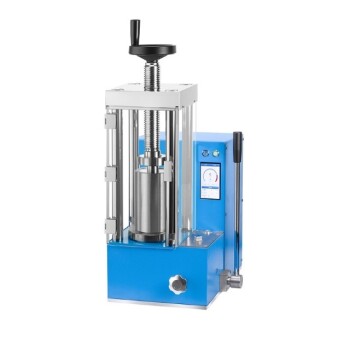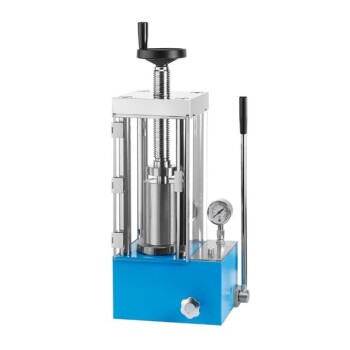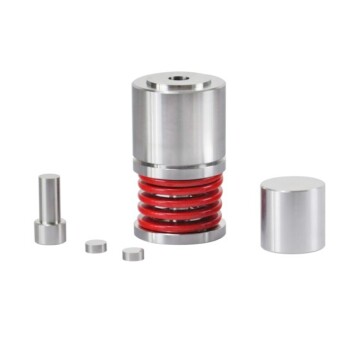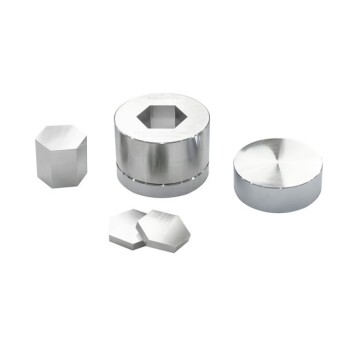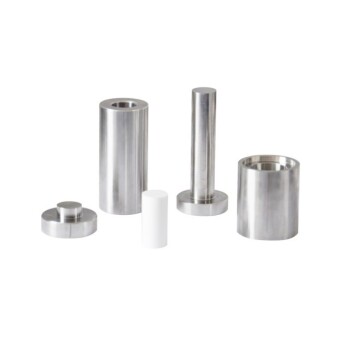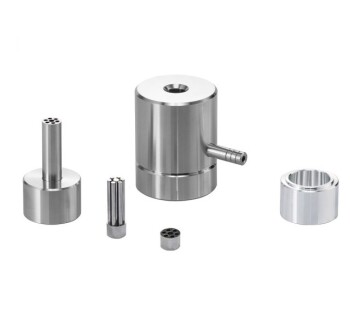For pharmaceutical production, isostatic pressing delivers significant advantages over traditional methods. It allows for the creation of drug formulations with higher concentrations of active ingredients in smaller, more patient-friendly doses. The process also yields products with superior mechanical strength and uniform density, which can improve drug bioavailability and ensure the tablet's integrity from manufacturing to patient.
Isostatic pressing fundamentally solves the core problem of non-uniform compaction seen in traditional tablet making. By applying equal pressure from all directions, it creates a final drug form that is denser, stronger, and more consistent, directly impacting both manufacturing quality and therapeutic effectiveness.
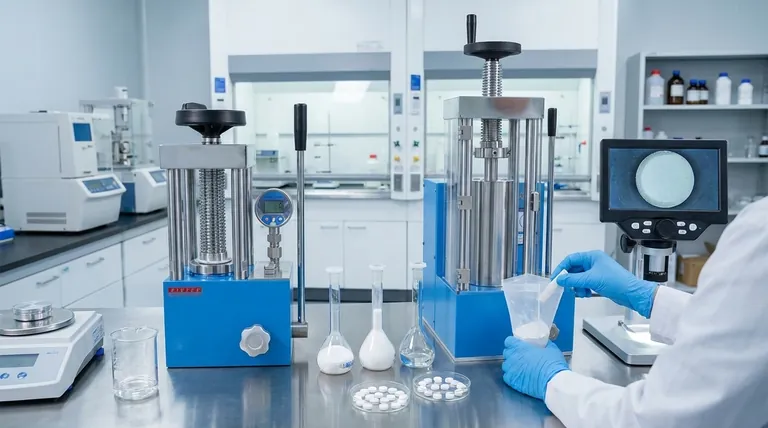
How Isostatic Pressing Works
Traditional tablet manufacturing uses uniaxial pressing—essentially a piston pushing down on a powder in a die. This creates significant friction against the die walls, leading to density variations and potential weak points in the tablet. Isostatic pressing is a fundamentally different approach.
The Principle of Uniform Pressure
In isostatic pressing, the drug powder is sealed in a flexible, elastic mold. This sealed mold is then submerged in a fluid (like water or oil), and the fluid is pressurized. This pressure is transmitted equally and simultaneously to all surfaces of the mold.
The result is a highly uniform compaction force. Instead of being pushed from one direction, the powder is squeezed evenly from all sides, much like an object under deep-sea pressure.
Eliminating Voids and Defects
This uniform pressure is exceptionally effective at collapsing voids and air pockets within the powder. The process eliminates the density gradients and internal stresses common in uniaxially pressed parts, resulting in a homogenous final product free from internal defects.
Overcoming Die-Wall Friction
Because the powder never makes contact with a rigid die wall during compaction, the problem of die-wall friction is completely eliminated. This not only ensures uniform density but also removes the need for lubricants, which can be potential contaminants in a pharmaceutical formulation.
The Direct Impact on Drug Formulation
The physical advantages of isostatic pressing translate directly into tangible benefits for drug development and patient outcomes.
Enhanced Bioavailability
A tablet with uniform density dissolves more predictably. By eliminating high- and low-density zones, isostatic pressing can help ensure a more consistent dissolution rate, which is a critical factor for achieving reliable drug bioavailability and therapeutic effect.
Higher Drug Loading
The process achieves exceptionally high compact densities. This means more active pharmaceutical ingredient (API) can be packed into a smaller volume. This is a major advantage for high-dose medications or for improving patient compliance by making pills smaller and easier to swallow.
Unmatched Mechanical Integrity
Isostatically pressed tablets exhibit superior "green strength" (the strength of the tablet before any secondary processing like coating). They are far less prone to chipping, capping, or breaking during handling, coating, and packaging. This reduces manufacturing waste and ensures the patient receives the intended dose.
Flexibility for Complex Designs
The technique is not limited to simple cylindrical shapes. Because it uses a flexible mold, isostatic pressing can produce complex and novel drug delivery forms that would be impossible with traditional rigid dies.
Understanding the Trade-offs
While powerful, isostatic pressing is not a universal replacement for all tablet manufacturing. Understanding its limitations is key to making an informed decision.
Process Speed and Throughput
For producing billions of simple, standard-shaped tablets, high-speed rotary tablet presses still offer unmatched throughput. Isostatic pressing is generally a slower, batch-oriented process, though systems for mass production are available.
Equipment and Tooling Costs
The initial capital investment for isostatic pressing equipment is typically higher than for a conventional tablet press. The flexible molds also represent a recurring tooling cost and must be carefully designed and validated for the specific drug powder.
Suitability for the Material
The technique is ideal for powders that are brittle, abrasive, or otherwise difficult to compact using traditional methods. For simple, easy-to-press formulations, the benefits may not outweigh the added complexity and cost.
Making the Right Choice for Your Goal
Selecting the right compaction technology depends entirely on the specific challenges of your drug formulation and your ultimate goals.
- If your primary focus is high-dose drugs or patient compliance: Isostatic pressing is an excellent choice for creating smaller, highly concentrated tablets.
- If your primary focus is a fragile or difficult-to-press API: This method excels at forming robust tablets from brittle or fine powders while minimizing defects.
- If your primary focus is developing a novel drug delivery system: The ability to form complex shapes makes isostatic pressing a key enabling technology.
- If your primary focus is high-volume production of a standard tablet: Traditional rotary pressing likely remains the more cost-effective and efficient solution.
Ultimately, isostatic pressing provides a powerful tool to solve specific, challenging problems in pharmaceutical manufacturing that traditional methods cannot.
Summary Table:
| Benefit | Description |
|---|---|
| Uniform Density | Ensures consistent compaction for reliable drug dissolution and bioavailability. |
| Higher Drug Loading | Packs more active ingredient into smaller, patient-friendly doses. |
| Superior Mechanical Strength | Reduces chipping and capping, improving tablet durability. |
| Flexibility in Design | Enables complex shapes for innovative drug delivery systems. |
| Elimination of Lubricants | Removes potential contaminants by avoiding die-wall friction. |
Enhance your pharmaceutical production with KINTEK's advanced lab press machines! Whether you need automatic lab presses, isostatic presses, or heated lab presses, our solutions deliver uniform compaction, higher drug loading, and superior tablet integrity—perfect for laboratories tackling high-dose formulations, fragile APIs, or novel drug delivery systems. Contact us today to discuss how we can optimize your drug manufacturing process and improve patient outcomes!
Visual Guide
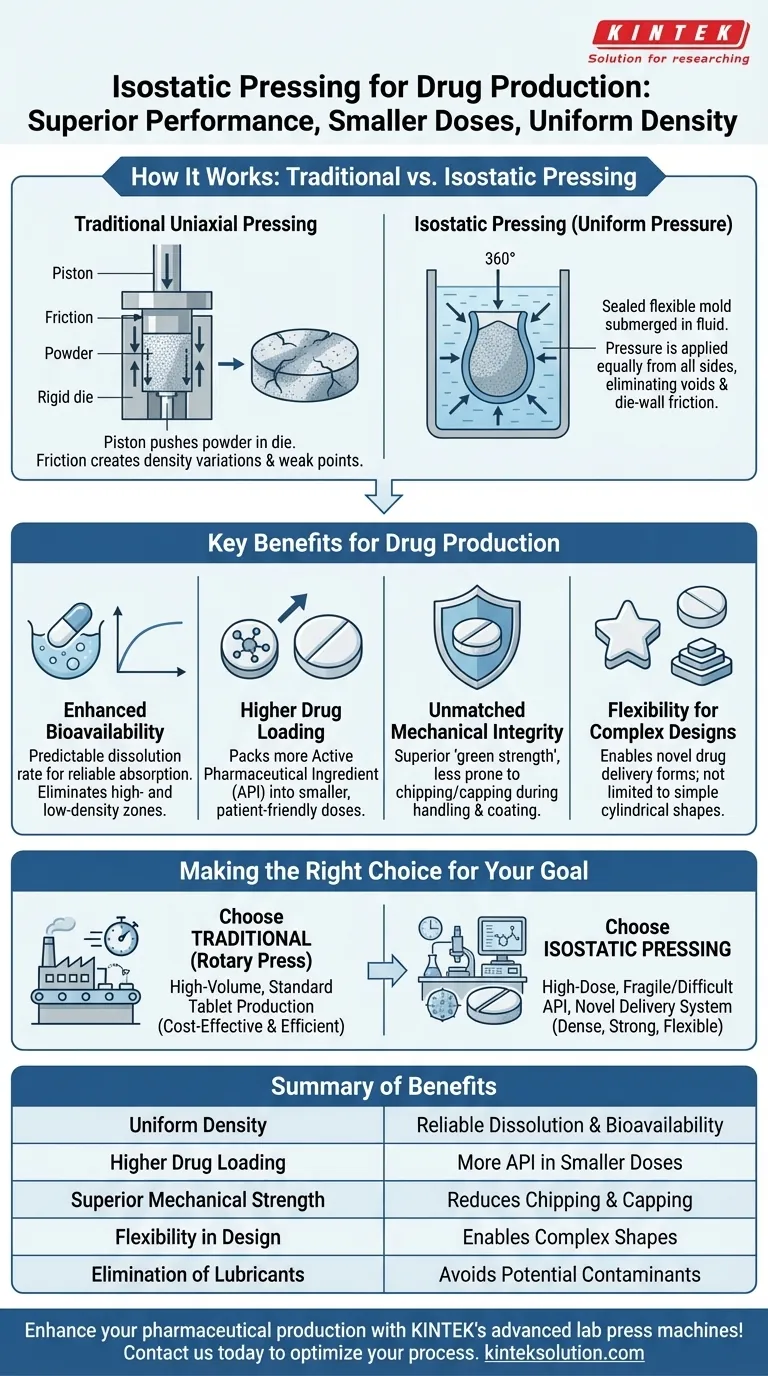
Related Products
- Electric Lab Cold Isostatic Press CIP Machine
- Electric Split Lab Cold Isostatic Pressing CIP Machine
- Automatic Lab Cold Isostatic Pressing CIP Machine
- Manual Cold Isostatic Pressing CIP Machine Pellet Press
- Laboratory Hydraulic Press 2T Lab Pellet Press for KBR FTIR
People Also Ask
- What are the advantages of uniform density and structural integrity in CIP? Achieve Superior Performance and Reliability
- What is the standard procedure for Cold Isostatic Pressing (CIP)? Master Uniform Material Density
- In which industries is CIP commonly applied? Discover Key Sectors Using Cold Isostatic Pressing
- What are the characteristics of the isostatic pressing process? Achieve Uniform Density for Complex Parts
- What are the standard specifications for Production Cold Isostatic Press Systems? Optimize Your Material Compaction Process
